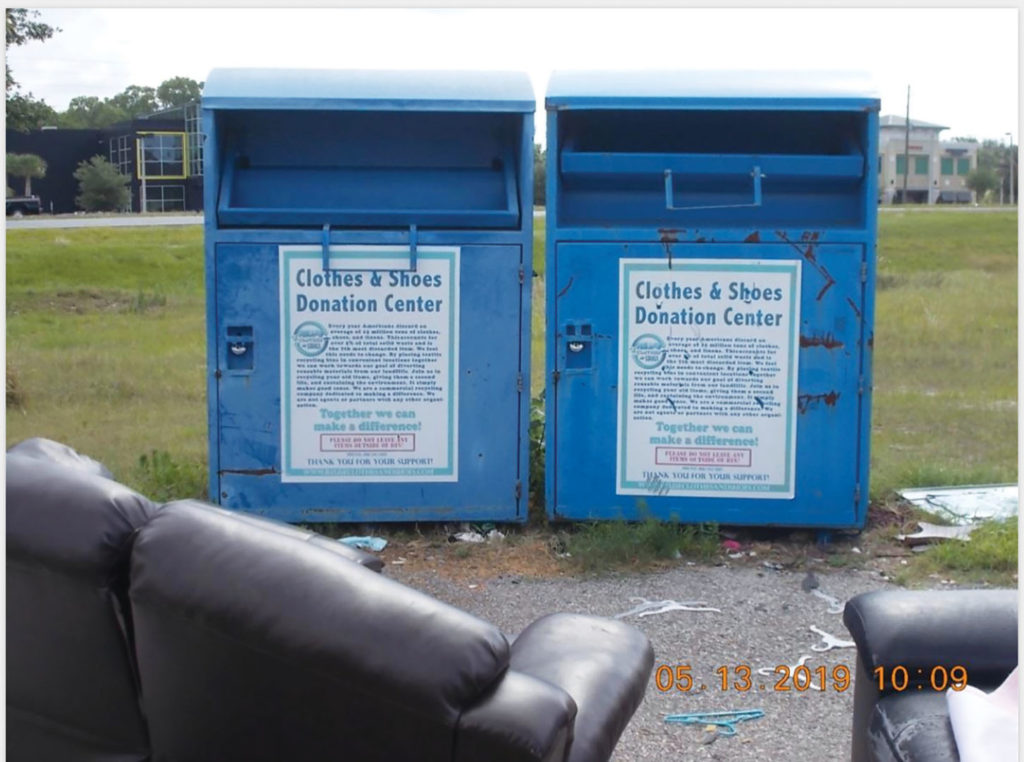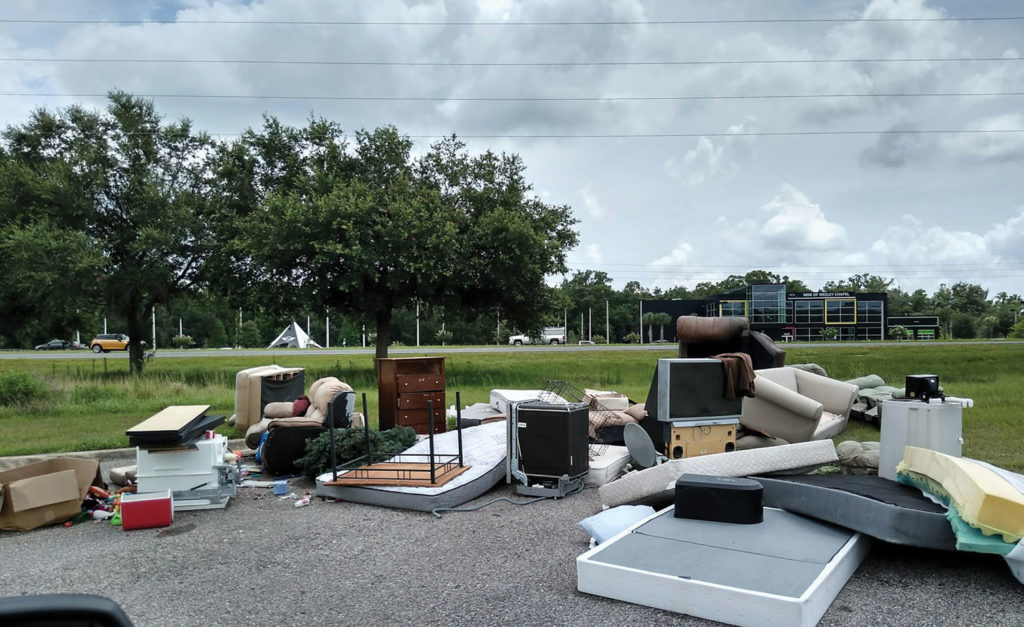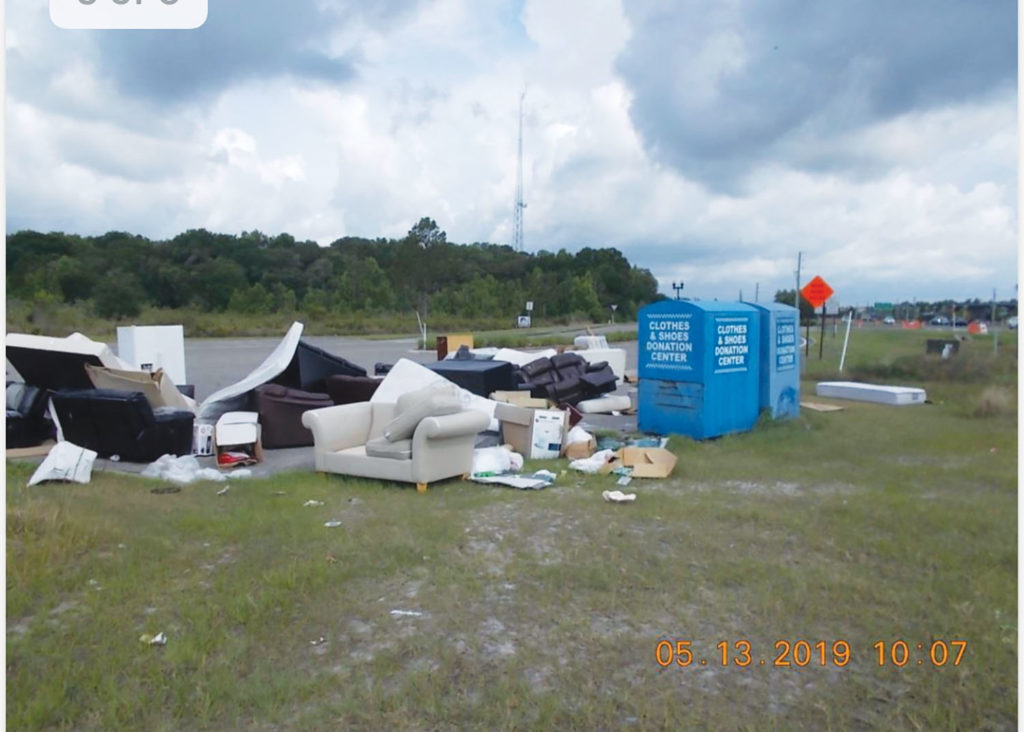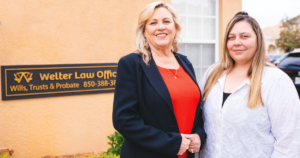
Those blue bins still have Pasco County District 2 commissioner Mike Moore seeing red.
Moore is renewing an old fight against donation bins that seem to be a breeding ground for mini-junkyards, as a recent spate of trash dumpings have pushed him to ask for stiffer rules and harsher penalties.
Moore, who originally pushed to enact an ordinance passed in 2016 making it harder to leave unmanned bins scattered around the county, is rolling his sleeves back up. The Seven Oaks resident’s district serves most of Wesley Chapel, and one recurrent dumping ground on S.R. 56 just east of I-75 has him particularly unhappy.
“When we did that (ordinance in 2016), a bunch of them did go away,” says Moore. “It wasn’t as bad. But now that the dust has settled, they have been starting to reappear all over the place.”
That may not be much of a surprise. The 2016 ordinance required that those operating the donation bins apply for a permit, which entailed producing a site plan and receiving written permission from the landowner, as well as a regular pick-up schedule to be followed.
And how many bin operators have applied for a permit since then?
“Zero,” says Moore.
Three of the dumping locations — there are many all across the county, Moore says — that have gained a lot of attention among Neighborhood News readers the past month are in Wesley Chapel, including one near his home.
A pair of bins placed across the street from the Wesley Chapel Mini car dealership near the Texas Roadhouse restaurant, and another near the Sam’s Club (also on S.R. 56) have been attracting items not intended as donations.

Resident Dan Ballman posted the photo above on the Wesley Chapel Community Facebook page on June 9 pleading for an answer to the illegal dumping problem, with a two pictures of the dumping site between Texas Roadhouse and TD Bank.
One picture, he wrote, was taken on May 26, and the second was taken two weeks later, after the junk pile had doubled in size.
A dresser, at least five couches, six mattresses, a television set and what appears to be a dishwasher can be seen in the pictures. it looked as if enough items were dropped off to fully furnish a one-bedroom apartment.
Facebook page members have called the dumpers “lazy,” “horrible” and “disgusting,” while suggesting that the county install cameras in certain hot spots to catch the lawbreakers in the act.
Moore says the county already has asked code enforcement and the Pasco Sheriff’s Office to investigate, and said cameras have been placed at other locations he cannot reveal.
Moore said some bins have been seized as evidence for potential criminal proceedings. Although the bins are labeled for charitable donations, the commissioner thinks they are full-fledged businesses cashing in.
“Companies are collecting textiles to be reimbursed for it, to sell it,” Moore says. “Some say they give a portion of the funds to charity. We can’t confirm or deny that, because when you call the number on the bin, there’s no answer.”
While the bins themselves — which are not picked up in a timely fashion and are often overflowing — are a problem, District 1 commissioner Ron Oakley pointed out that those dumping items with no intention of putting anything in a bin also are an issue.
Commissioner Moore, however, said it is the bins themselves that begin the process of sites turning into junkyards. Commissioner Kathryn Starkey called the bins “magnets” for junk haulers to unload their stuff.
Moore said he suspects some of the junk dumpers are professionals who get paid to haul away large items but then decide to unload it somewhere other than the nearest junkyard — the Pasco County Transfer Station (PCTS) at 9626 Handcart Rd. in Dade City — to avoid paying a fee.
The PCTS charges $2.96 for every 100 pounds dumped.
When the county has to clean up these eyesores, it is at the taxpayers’ expense, Moore says.

On May 21 at a Board of County Commissioners meeting in New Port Richey, Moore suggested that the county ban unmanned collection bins altogether, which would affect legitimate collection bins like those used for recycling and those used by churches. County assistant attorney Kristi Sims said that the county would “quite definitely” be sued.
“I cannot stand up here and tell you we will win,” Sims said.
What the county has done is that it has begun monitoring various sites and seizing bins, and some sites that have been cleared out have since been repopulated with more bins — or more junk.
The county also sent 40 letters to property owners where the bins are being placed, asking if they had given permission; 15 of those letters involved bins from one company.
About 20 have responded, “and not a single one has said they gave permission,” Moore said.
Those who haven’t replied have until July 1 to do so.
Sims suggested that Moore hold off on pushing for a ban and allow for renewed enforcement efforts this summer to take hold. “Let’s see how this shakes out,” she said.
Moore said the county needs to end the problem as soon as possible. He is promoting strict enforcement of the ordinance and stiff penalties — including third-degree felony charges for dumping more than 500 pounds (or 100 cubic feet in volume), which carries with it up to five years in prison.
“I’m frustrated,” Moore said, “That’s why we’re taking it to next level. Now, we’re going to go out, and we’re going to catch them. We’re going to prosecute (them). We need to catch a few of them, and if they meet the criteria for a felony, they are going to be in bad shape.”




No comment yet, add your voice below!